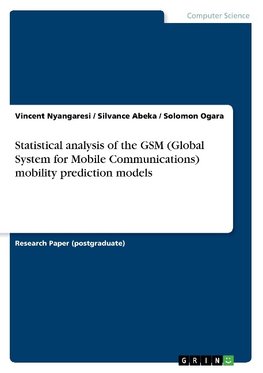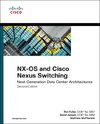
-
 Anglický jazyk
Anglický jazyk
Statistical analysis of the GSM (Global System for Mobile Communications) mobility prediction models
Autor: Vincent Nyangaresi
Research Paper (postgraduate) from the year 2017 in the subject Computer Science - Miscellaneous, grade: -, , course: Information Technology Security & Audit, language: English, abstract: In the GSM environment, mobility prediction is concerned with envisaging... Viac o knihe
Na objednávku
25.92 €
bežná cena: 28.80 €
O knihe
Research Paper (postgraduate) from the year 2017 in the subject Computer Science - Miscellaneous, grade: -, , course: Information Technology Security & Audit, language: English, abstract: In the GSM environment, mobility prediction is concerned with envisaging of the mobile station's next movement. By accurately employing the predicted movement, the GSM network is capable of attaining enhanced resource allocation and reservations, better assignment of cells to location areas, more efficient paging, and call admission control. Numerous studies have been carried out in mobile station prediction and as such, many mobility predictions have been developed. The goal of this paper was to statistically analyze these mobility prediction models in order to understand their strengths and weaknesses. The results of this analysis indicated that the current mobility models base their predictions on movement patterns of users throughout physical space. However, they do not directly relate to movement throughout the network based on the cell presently hosting a mobile station. In addition, several base transceiver stations may overlap over a single physical location, a complication not captured by the current mobility prediction models. Therefore, there is need for a generic mobility prediction model that can depict movement of mobile users more realistically within the GSM network coverage areas. As such, this paper proposes the development of a mobility prediction model that is capable of accurately reflecting mobile station movement in real-world cellular networks, taking into consideration the actual scenarios such as base transceiver stations overlapping. The requirements for this novel mobility prediction model are also provided, and were based on the shortcomings noted in the existing mobility prediction models. The significance of the proposed model lies on the fact that in order to pre-allocate resources for seamless connectivity during handovers, the mobility prediction model should anticipate the actual cell that the mobile station will next connect to, rather than the physical location they will move to.
- Vydavateľstvo: GRIN Verlag
- Rok vydania: 2017
- Formát: Paperback
- Rozmer: 210 x 148 mm
- Jazyk: Anglický jazyk
- ISBN: 9783668493940

 Nemecký jazyk
Nemecký jazyk 










